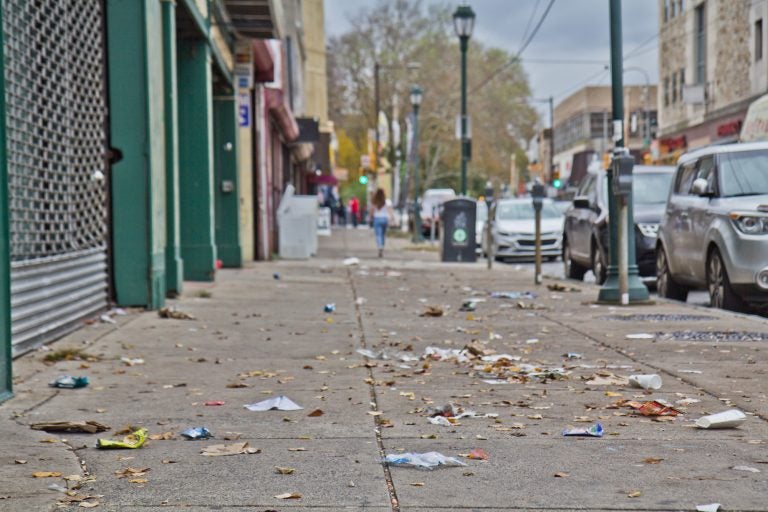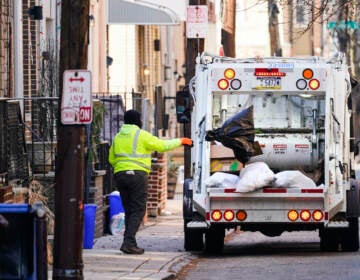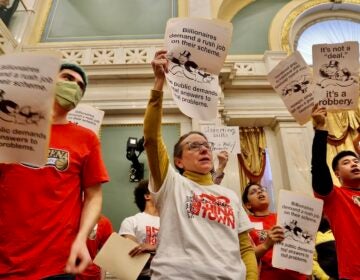Ineffective trash clean-up leads Germantown business owners to end special service district
The future of the Germantown Special Services District is in doubt after commercial property owners voted to block its re-authorization.

An unswept street in the Germantown Special Services District on Nov. 2, 2018. (Kimberly Paynter/WHYY)
This article originally appeared on PlanPhilly.
—
The future of the Germantown Special Services District — and its mandate to keep Germantown Avenue free of litter — is in doubt after commercial property owners voted to block its re-authorization.
The organization’s principal goal is to clean the Germantown and Chelten avenue business corridors, but over the last year, the organization struggled to do so. The special services district’s funds are largely raised from a fee assessed on commercial property owners.
A bill to approve a new five-year plan and budget for the 24-year-old municipal authority stalled at a City Council Rules Committee hearing Wednesday, after over 100 property owners delivered letters opposing the organization’s reauthorization. This degree of opposition is extremely unusual and will prevent the organization from collecting the fees it needs to operate.
Councilperson Cindy Bass, who represents Germantown, denounced the property owners campaign against the renewal of the special services district.
“The Germantown Special Services District was really effective for quite some time. Then it hit a speed bump and these folks decided they just wanted to kill it,” said Bass. “Those who fought so hard against something that was working up until a minute ago should be held accountable for whatever repercussions happen for ending the special services district.”
The overwhelming majority of Germantown Special Services District’s (GSSD) funding comes from a fee that is the equivalent of 12% of their building’s property taxes. Only a third of those affected had to vote against the re-authorization, and after a tumultuous 2018 — and a revolving door of five executive directors over the last five years — more than enough property owners called it quits.
Starting last summer, litter began to accumulate on Germantown and Chelten avenues as GSSD’s principal task went unfulfilled. Then the organization’s prior five-year plan expired on Sept. 30 without a replacement. The GSSD hasn’t been able to collect fees from property owners since.
Earlier in 2019, the board voted to seek re-authorization. But 41.8% of property owners voted no after a campaign led by a handful of stakeholders including Ken Weinstein, one of the most prominent landowners and property developers in Northwest Philadelphia. He lives in neighboring Mount Airy, but owns a substantial amount of property in Germantown.
Weinstein has long argued that the GSSD’s board did not adequately represent property owners. Unlike other municipal authorities in the city, the GSSD’s board includes numerous members of Councilmember Bass’s staff and a lesser proportion of property and business owners.
Weinstein instead argued for a business improvement district (BID), where he envisioned property owners electing the board.
“Re-authorization of GSSD was overwhelmingly rejected by property owners because it was not functioning,” wrote Weinstein in an email message.
“Curbs and sidewalks were not being cleaned,” wrote Weinstein. “Required audits were not being performed. There was little transparency and accountability. Other communities, with BIDs, enjoy a litter-free environment. Germantown deserves the same.”
Bass said she is not interested in allowing a business improvement district to take root where GSSD once cleaned the streets. Instead, she accused Weinstein of undermining the organization for his own reasons.
“To not live in the community and to make an attempt to use this organization, at a weak point, for your own financial and personal gain as a stakeholder and a landowner in the district, I think is highly irresponsible,” said Bass.
Since its founding in 1995, GSSD suffered over the course of its history, as the neighborhood’s small commercial tax base hampered ambitious plans for its expansion and internecine board squabbles hampered its missions.
Many of the other municipal authorities created in the same era, like the Old City District or the South Street Headhouse District, experienced success. They also were based in neighborhoods with greater resources to draw on, giving them an advantage, but they also generally operated with much less direct oversight by City Council.
For now, the GSSD is effectively dead in the water. It still exists as a legal entity but it cannot assess the fees that were responsible for 77% of its budget. In the future, the board could attempt to secure funds from grants or municipal sources. Further out, they could try for reauthorization again.
Meanwhile, the litter will likely continue to go untouched on Germantown and Chelten avenues.
WHYY is your source for fact-based, in-depth journalism and information. As a nonprofit organization, we rely on financial support from readers like you. Please give today.







